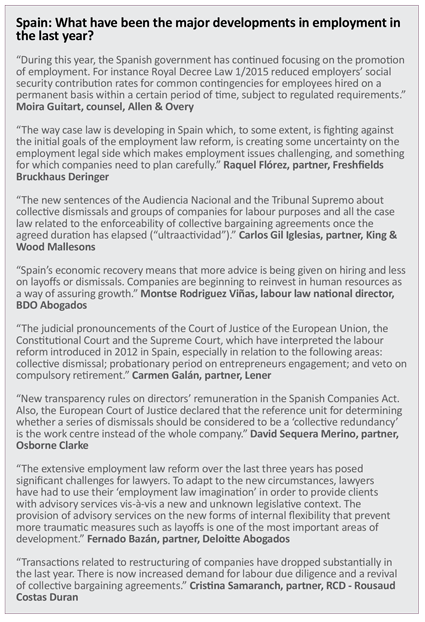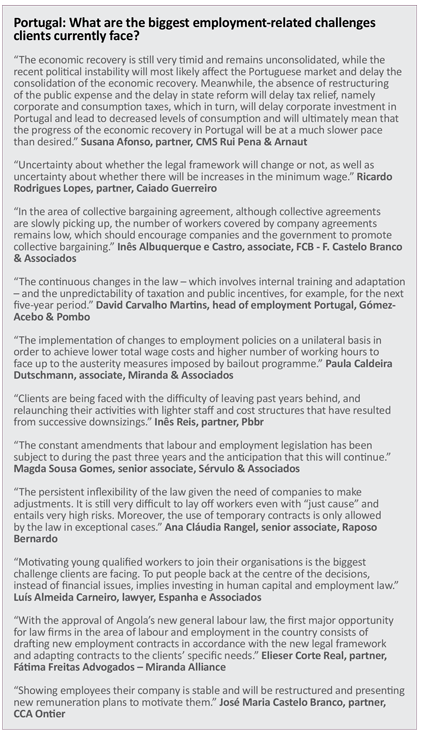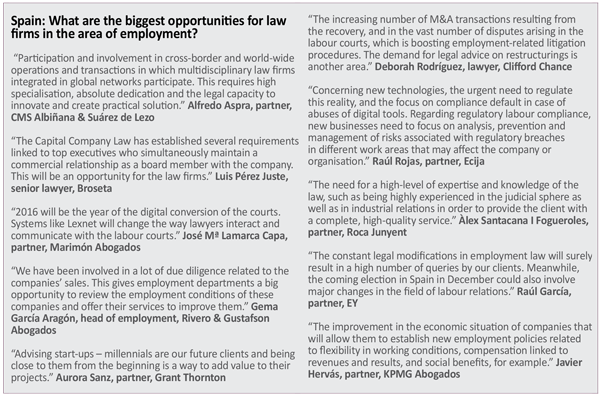Employment Special Report 2015: All change?
Political upheaval in Spain and Portugal means it’s possible that the two countries’ labour laws could change significantly in the coming year – however, anxiety among investors could be good news for employment lawyers who will be needed to provide advice on the best way to proceed in an uncertain climate
While clients are enjoying a little more clarity with regard to what employment rules and regulations they must adhere to in Spain, it would be wrong to say that all doubt has been removed. Indeed, the country’s Supreme Court has been divided on the issue of how it should interpret some elements of the 2012 Labour Reform. If that is not unsettling investors, perhaps the prospect of a new labour law being introduced in Spain after the general election in December 2015. However, while clients may have worries due to the uncertainty surrounding employment regulations, such uncertainty plays into the hands of lawyers who will be sought out by company bosses seeking to put their minds at rest. It is a similar story in Portugal where the recent change of government is expected to trigger significant changes to labour laws.
Spain’s 2012 Labour Reform intended to make collective dismissals easier, but in practice it often made them more difficult, says Román Gil, partner at Sagardoy Abogados. He adds that this is partly because Spain’s Supreme Court has not always been able to solve some issues [created by the Labour Reform] with enough clarity “due to a split – which some say is on ideological grounds – on the adequate interpretation”. Naiara Rodríguez Escudero, counsel at Linklaters, says there is “no consensus in parliament” with regard to the Labour Reform, which has also been “received terribly” by trade unions. Cuatrecasas, Gonçalves Pereira partner Juan Bonilla says that a new government following the elections in December is likely to mean a “new labour law”. He adds that consensus on employment law is needed, though the lack of consensus is “good for lawyers”.
Gil says there has not been any major new legislation in the last year and thus there is more “legal certainty” with regard to some employment issues. However, in collective dismissal procedures, it is not clear what documents should be provided, according to Gil. He adds: “Unions ask for thousands of documents, there are many hurdles and if one hurdle is missed, there is a problem.” Another issue is that some of the minor trade unions are trying to raise their profile and therefore they “challenge everything”. Gil adds there is a “fight among unions to be the most radical”.
Unions more aggressive
Mario Barros, partner at Uría Menéndez in Madrid, says that, in collective dismissal cases, some trade unions tend to face the negotiation period as the preparatory stage for a court case. He adds: “In light of the number of judgments classifying collective dismissals as void, some trade unions are less prepared to enter agreements.” However, with regard to collective dismissals, Bonilla says there has been a shift in that unions no longer dispute the business case for making redundancies. Hogan Lovells senior associate Vidal Galindo says that one of the consequences of the most recent employment reforms in Spain regarding collective dismissals is that the parties are now taking a different approach to negotiation and “the compensations agreed are lower than before the reforms”.
The Spanish courts need to be careful interpreting employment law and be aware of how it may affect potential investment in the country because “the world is looking at us”, according to Gil. He adds: “It [company restructuring] can be done in Spain and it can be done at a lower price [than other jurisdictions] – Spain is competitive in terms of labour regulations, you can do reasonable restructuring in most cases.” David Díaz, partner at Baker & McKenzie, says that, while there is uncertainty surrounding the interpretation of the 2012 Labour Reform, it is “not preventing foreign companies investing in Spain”. With regard to the appeal of Spain to foreign investors, Pérez-Llorca partner Fernando Ruiz says employment laws are “more flexible” in Spain than they are in, say, France, for example.
Most of the largest corporate restructurings have already taken place and companies are now “fine-tuning” their organisations and implementing measures aimed at reducing costs, but maintaining levels of employment, according to Galindo. He adds: “This is an opportunity for lawyers. We can be involved in projects designed to improve the organisation and companies’ situation.”
 50 per cent rate cuts
50 per cent rate cuts
Gil says there is strong competition in the market for employment-related legal services and, consequently, fees are going down, with rates dropping around 30 per cent in the last year. However, other market sources say 30 per cent is a conservative figure, and that rates have actually fallen by as much as 50 per cent. Rates are “recovering slightly”, according to Díaz. But he adds that law firms have to provide added value, which could involve providing training for in-house teams, for example. He continues: “You have to have very good junior people as they now have to take more responsibility.” Gil says that defending executives in employment-related disputes is very profitable for law firms: “Lawyers defending corporations are probably making ten times less,” he adds. However, conflicts of interest prevent some law firms from acting for executives in employment disputes, says Díaz.
Clients are not price-sensitive when it comes to lawyers carrying out internal investigations, which can be a more lucrative type of work, according to Díaz. “With internal investigations, clients care less about fees,” he says. Galindo says legal fees have gone down in recent years. However, he adds: “In those projects in which we can really add value, the clients are happy to involve lawyers, and fees are usually in accordance with the relevance of the matter.”
Being efficient is one of the major challenges now facing employment lawyers, according to Bonilla. “The high value work cannot be done by junior people,” he adds. There is more pressure on law firms to provide a partner-led service, according to Pilar Albert, partner at Araoz & Rueda. She continues: “Clients are demanding more specialised work, such as restructurings and less compliance work – the latter is being carried out by in-house lawyers.”
Bonilla says that there could be an increase in small boutique employment law firms. Lawyers are more likely to offer more if clients treat them in a reasonable way according to Gil. “You get the best out of people if you treat them fairly,” he says.
Political uncertainty
Political instability will have an impact on employment legislation with the result that it will be difficult for clients to plan ahead, according to Bonilla. He adds that some companies may do restructurings before the Spanish general election in order to avoid post-election uncertainty. Bonilla says the economic conditions are improving and that law firms now have to become more efficient and add value. Díaz adds: “If there is economic growth, there will be more transactions and law firms will become more profitable.” The worst thing for lawyers is an economy that is not moving at all, according to Barros. He adds: “I hope we’re exiting from the crisis, there is still restructuring work, but there are also M&A transactions, though there is some uncertainty due to the upcoming elections.” Rodríguez Escudero says that some investors are awaiting the outcome of the elections before making decisions.
The nature of employment work being carried out by lawyers will change, according to Ruiz. “It will be more focused on compensation schemes and high-level work, while there will be more involvement in corporate transactions,” he says. Galindo says that, due to the uncertainty of the economic situation and also regarding the result of the Spanish election, there is “less movement in the market and clients are waiting until next year to decide about some deals.”
The problem law firms now have to deal with is finding “new projects” and new sources of revenue, says Gil. He adds: “The income of employment departments doubled during the crisis, but the challenge now is the issue of future income and finding new projects.” Albert says: “Lawyers sell knowledge, how we value and price that knowledge will be the greatest challenge in our practice.” She continues: “Lawyers are forced to consider price reductions – this may simply involve doing the same work for less than in the past, but it may also involve a complete analysis of the competitive marketplace, so that the firm understands where the competitive pressures are coming from.”
Portugal: Labour code changes
Among the most significant employment law-related developments in Portugal in the last 12 months was the end of the suspension of clauses in collective bargaining agreements “providing for extra work bonuses that exceeded those provided for by law”, MLGTS partner Helena Tapp Barroso says. Meanwhile, recent amendments to the Portuguese Labour Code included the addition of gender identity to the “illustrative list of features on the basis of which no discrimination, privilege or prejudice may influence recruitment or labour rights or conditions”, Tapp Barroso adds. In addition, a further amendment was made which extended parental leave for fathers.
In the last year, the Portuguese Labour Code was slightly changed with regard to “what concerns the termination of employment on objective grounds – failure to adapt and individual redundancy – and on the applicability of collective bargaining agreements”, PLMJ partner Nuno Ferreira Morgado explains. He adds: “The changes, although minor, were influenced by the need to ensure that the legal framework may be a tool for growth and economic recovery.”
Legal work related to collective dismissals has become commoditised, in the sense that companies have insourced the bulk of this type of work as a result of a “knowledge transfer from law firms that have provided advice on previous matters”, says Vieira de Almeida associate Tiago Piló. He adds: “Another trend is the demand for training of in-house human resources teams as a way of building up internal capabilities and reducing dependence on external law firms.”
Filipe Fraústo da Silva, partner at Uría Menéndez-Proença de Carvalho, says measures introduced in 2012 and 2013 that allowed fixed term employment agreements to be “extraordinarily renewed” will not be re-enacted and therefore a large number of fixed term employment agreements could come to an end without being converted to permanent contracts.
 Building up pension funds
Building up pension funds
Significant mergers and privatisations are currently taking place in Portugal, says Ferreira Morgado, who adds that this is creating opportunities for lawyers. He continues: “There are also some opportunities in offering small labour due diligence, not focused on compliance but in finding measures or implementing tools that can have an immediate impact on cash flows and improve companies’ efficiency and productivity levels.”
Advising clients on how to build up private pension funds will be a major opportunity for lawyers, according to Piló. He adds that, despite the recent change in government, there is one point on which the major political parties agree, and that is “the social security system, namely in relation to retirement for age regulations, is not sustainable as is”. Piló continues: “The fact is that, although amendments were introduced with a view of mitigating the negative impacts related to life expectancy increase, there is a general consensus that further amendments shall be necessary to rebalance the social security deficit.”
Continuing globalisation and an increase in “transnational operations” means companies need law firms that organise teams that provide a seamless service, across different jurisdictions, according to Tapp Barroso. She continues: “Law firms with the capability of providing this type of assistance and legal expertise are, without doubt, in a position to provide more efficient and focused assistance to clients.” Opportunities for employment lawyers will be created if Portugal’s new government takes the anticipated step of ending measures that were introduced to reduce the amount of compensation employers must pay when terminating employment, says Linklaters associate Marta Afonso Pereira.
According to Ferreira Morgado, among the most significant employment-related challenges faced by Portuguese companies include providing flexibility with regard to working hours and ensuring that, with companies now prepared to offer higher salaries, salary packages are “more aligned with company commitment, productivity and results, while being simultaneously tax efficient”.
Social media risks
Data protection is now a major issue for clients in an employment context, Piló says. He adds that this issue frequently arises when employers collect and process personal data about their employees: “Besides standard processing operations in human resources management services, there are many data protection-sensitive activities like monitoring and performance evaluation of employees as well as private use of company internet and e-mail services that require careful legal assessment, namely in those situations where transfers require additional safeguards because data is transferred to countries outside the EU that do not provide for an adequate level of data protection, for example the US.”
Meanwhile, the use of social media is creating a number of employment-related issues for clients, Cuatrecasas, Gonçalves Pereira partner Maria da Glória Leitão says. “The use of social media either through use of the company’s or the employee’s devices, is inescapable but it raises risks and issues that need to be managed.” In addition, the use of digital platforms to provide goods and services is also posing challenges, according to Da Glória Leitão. Recently, four drivers for Amazon’s Prime Now service filed a proposed class action lawsuit against the company in California in which they claimed the retailer had wrongly classified them as independent contractors and owed them unpaid overtime. Da Glória Leitão says the status of digital service providers from an employment perspective needs to be “carefully analysed”.
In recent years, there has been a huge increase in lawyers specialising in employment as well as a rise in the number of law firms that focus on this area, according to Filipe Azoia, founding partner at AAMM. He adds: “This means much greater competition and, particularly in terms of pricing, this creates constant challenges. Nowadays, it is essential to have vast experience in all areas of employment law, continuous training and an in-depth understanding of the client’s business. Law firms also have to be available 24 hours a day.” Azoia continues: “Furthermore, clients are increasingly demanding and this requires greater involvement in the process of making decisions about the management of companies, particularly when it comes to costs.”













